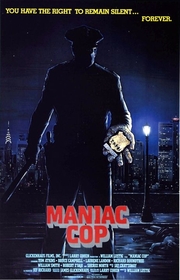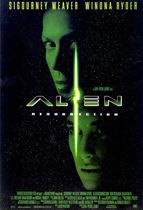Our editor-in-chief Nate Yapp is proud to have contributed to the new book Hidden Horror: A Celebration of 101 Underrated and Overlooked Fright Flicks, edited by Aaron Christensen. Another contributors include Anthony Timpone, B.J. Colangelo, Dave Alexander, Classic-Horror.com's own Robert C. Ring and John W. Bowen. Pick up a copy today from Amazon.com!
Maniac Cop (1988)
I think it is safe to say that by 1988, the slasher film had become a little tired and stale. It had been ten years since John Carpenter's Halloween had opened the cinematic floodgates; Freddy, Jason and Michael Myers were going through the motions in sequel after interchangeable sequel and even lesser efforts such as Sleepaway Camp were getting a second bite of the cherry. It was left to genre stalwarts Larry Cohen and William Lustig to breathe some life into it with Maniac Cop.
Innocent people are being brutally murdered on the streets of New York and all the witnesses say that the killer looks like a uniformed police officer. I say looks like, because he also seems to have hands as cold as ice and is immune to bullets. As the death toll rises, City Hall tries to pin the slayings on a young cop, Jack Forrest (Bruce Campbell), after his wife becomes one of the victims. As the body count grows, Forrest realizes that not only is he caught in a cover-up, but also the real killer has an agenda and is hell-bent on revenge against his former employers at the Police Department.
Maniac Cop provides us with a new type of villain, a move away from fire damaged child murderers and mask wearing psychopaths. However shocking their appearance and behavior may have been first time around, by the fourth or fifth sequel, the disfigured, scary looking monster becomes part of the slasher formula, along with the cringe worthy one-liners and nudity. Instead the idea behind Maniac Cop taps into the same kind of subversive territory as Parents or Invasion of the Body Snatchers, where the bad guys are the very people you should be running to for help. This flipping of some of our most basic assumptions about day-to-day life is one of the things I like best about the horror genre. As much as I enjoy flights of fantasy or Gothic horror, having something rooted in reality is to my mind far more disturbing, whether it is finding out that your Mom and Dad are cannibals, your wife is an alien, or that nice friendly officer you're fleeing towards for help is actually waiting to kill you. So this film certainly has a fantastic premise, and one that is ripe with potential to take it from being a run-of-the-mill slasher flick.
The opening 15 minutes are tremendous, with the Maniac Cop slicing his way through the Big Apple in some imaginative and well staged set pieces. A woman chased through the streets at night by two thugs is brutally throttled by the person she thought was coming to save her; a man in a car is pulled over for trying to jump a red light and his girlfriend watches in horror as his he throat is cut and his corpse thrown through the windshield; another man is handcuffed, chased down the street and suffocated face first in some (conveniently) wet concrete. Each one of these scenes uses tight editing and lots of shadows to build to a tense and bloody climax. Moreover, once the killer disappears back into the night, he leaves behind a city descending into panic and chaos, and an audience hooked, wanting to know where this is leading. Unfortunately, at this point, the rather confusing main storyline kicks in, and the film starts to fall apart.
Who is dropping hints to Bruce Campbell's wife to make her think that he is the killer? Is the Maniac Cop pulling the strings? But why is the Maniac Cop framing anyone? The killer is after the mayor, but why can't he just break into City Hall and finish the job (especially since he seems to be able to get in and out of anywhere undetected)? Is he a supernatural being? The doctor who signed his death certificate says he knew he was still alive, if severely brain damaged following a brutal prison beating. But how can he be bulletproof and able to seemingly appear and disappear at will?
Larry Cohen is a writer who is never short of ideas and likes to fuse standard genre elements with a satirical streak, such as in The Stuff where the nation is hooked on mind sapping edible white goo. Nevertheless, here he fails to translate these ideas successfully into a feature length screenplay. Some interesting themes are touched on in Maniac Cop, particularly about the attitudes of the police and public to each other. In one scene, with even law abiding white middle class citizens starting to panic at the sight of a uniform, a lady in a broken-down car guns down an innocent patrolman who has come to help her. However, these touches are brushed aside in favor of the somewhat muddled plot, and the whole thing feels as if he threw a bunch of ideas into a pot and just assumed the way to finish the story would emerge by the time shooting completed. Sadly, this didn't happen.
William Lustig is an imaginative director who creates creating some highly effective scenes. Aside from the opening murders, the Maniac Cop's attack on the Police Station Headquarters is tense and creepy, and relatively restrained, with most of the murders happening off camera. In addition, the flashback scene showing a prison shower beating is shot with enough slow motion homoerotic nudity, and cold blue lighting that it borders on stylish (if bloody) pornography. Unfortunately, this level of invention and terror is not sustained throughout, and long stretches of dull exposition start to grate on the viewer. Moreover, the (yawn) "twist" ending will not be a shock.
The film's other trump card, the one that makes it worth at least one viewing, is the cast of solid B-movie veterans. Bruce Campbell needs no introduction, even though he is somewhat restrained here and consequently, not as much fun to watch as he is normally, and Richard Roundtree make the most of his fleeting cameo as the Police Commissioner. However, the real star here is Tom Atkins, as the grizzled detective who doesn't buy into the official story behind the murders. His straight-faced approach to the role lends enough plausibility to some of the more ridiculous script elements, such as his figuring out that a cop murdered the first victim because nobody else would have the strength to kill her. When he is unexpectedly written out two thirds of the way in, the film never really recovers.
For all the positive points in Maniac Cop, (the highly original premise, quality set pieces and great cast) I could not help feeling that what might have been the most original take on the slasher genre since A Nightmare on Elm Street is something of a wasted opportunity. You have the right to remain disappointed.
Trivia:
Sam Raimi has a cameo as TV news reporter at the St Patrick's Day Parade
The scenes involving the Mayor and his aide were not in the original version of the film but were shot later to pad out the running time for Japanese television.








